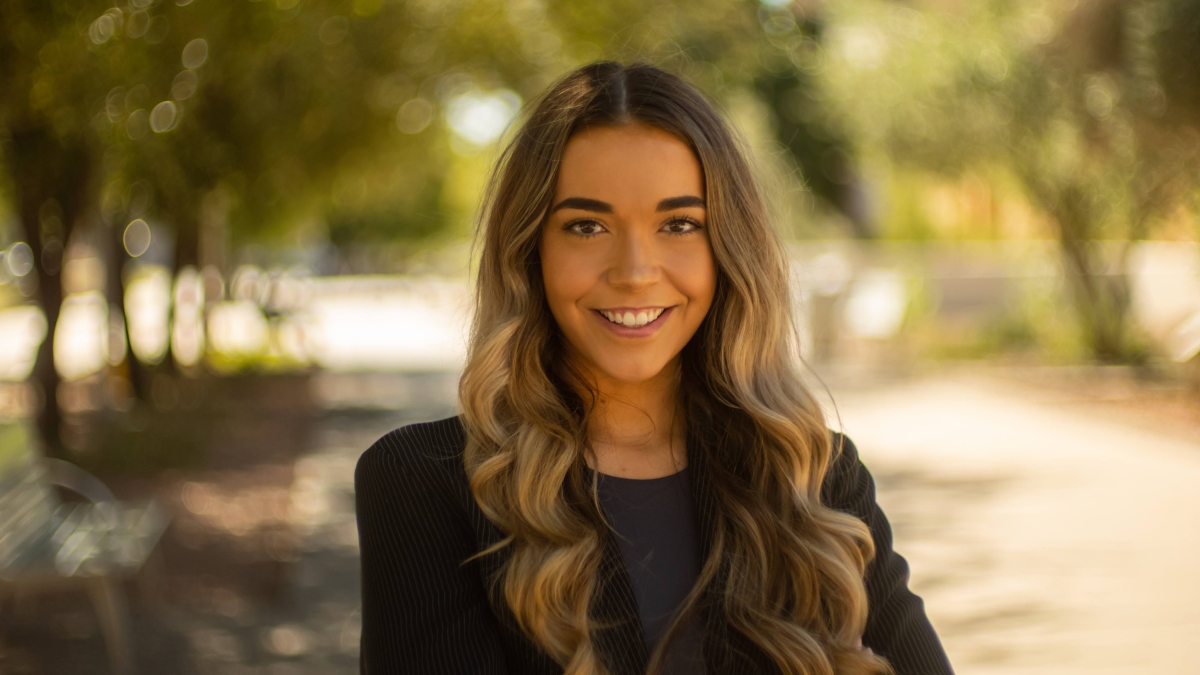Psychology Dean's Medalist aims to help teens recognize digital domestic violence

Annie Cooper is a senior psychology student who is graduating this December
Senior psychology student Annie Cooper came to Arizona State University as a transfer student from community college and immediately immersed herself in as many opportunities as possible.
She joined the Psi Chi Honors Society as the director of their social media accounts and found herself realizing that she could be the next president.
“I thought, why not give it a shot?” Cooper said.
Now, not only is she president of Psi Chi, but she conducts research as part of three labs — the Heart Lab with Associate Professor Thao Ha, the Behavioral Alcohol Research for Clinical Advancement Lab with Professor William Corbin and the Memory and Attention Control Lab with Associate Professor Gene Brewer.
Cooper, who is graduating this December, has been named the Dean's Medalist for the fall semester in the Department of Pyschology.
After graduating, Cooper intends on going to graduate school for behavioral neuroscience and hopes to continue conducting research on relationships, mental health and addiction.
“Each of the labs that I am a part of conduct important research on various parts of the human experience and I’m looking forward to growing more as a researcher in a graduate program,” Cooper said.
While conducting research, she also launched her own full-service marketing company to promote nutritional supplements through strategic social media and influencer marketing. This social media marketing background gave her an insider’s look into her honors project with the Heart Lab.
“For me, I enjoyed marketing, but it's not something I saw myself doing in the long term. I wanted a career that felt purposeful and I didn't really think marketing could give me that. Once I started getting involved with research, I found that it's something that really excites me,” she said.
Cooper joined the Heart Lab two years ago while she was volunteering at a Title I high school in Phoenix. She noticed that many of the girls had been through difficult experiences, including many unhealthy relationships with partners, parents, family and friends.
“I was interested in how those affected the students long term, even just after seeing them in the classroom and things they were struggling with. It was more than anything I'd ever seen at other public schools,” Cooper said.
This experience translated to her research in the Heart Lab.
According to a national survey of high school students, more than 28% had experienced digital dating abuse in the past year with 32% of male students and 24% of female students reporting having experienced it. Among students with dating experience, 76% reported either using or experiencing at least one digital dating abuse behavior in their lifetime and 59% reported both using and receiving digital dating abuse behavior.
“Right now we're looking at parental mediation, a strategy used by parents to monitor and regulate their child's media use and digital dating abuse. We're seeing if the two relate to one another – if parental mediation makes parents more aware of digital dating abuse. A lot of parents aren't aware that this is such a problem,” Cooper said.
“The problem with digital dating abuse is that it lacks the boundaries of in-person abuse. This means it is a lot easier to have this consistently happen to you if you're in a relationship like that. We're looking at this research to see if parents are aware of digital dating warning signs so we can hopefully come up with good interventions in the future,” she said.
Cooper’s independent project highlights the importance of parental involvement in adolescent relationships.
“Annie is one of those students who is always willing to step up, and she shows great initiative in research. Her independent research project with fellow student Shane Kasmarogi is an excellent example of how she can turn something she is interested in into a research project,” said Ha, the lead researcher at the Heart Lab.
In addition to her work in the Heart Lab, she is conducting research on trauma and its impact on cognition with the Memory and Attention Control lab.
“We're trying to look at trauma and cognition and see how people with the highest 20% ratings of trauma perform on these cognitive assessments versus the people who don't,” Cooper said. “This includes developmental trauma as well as more acute trauma, like a traumatic brain injury.”
Cooper is also a research assistant in the Behavioral Alcohol Research for Clinical Advancement Lab lab where she is conducting a literature review for internalizing disorders such as anxiety and depression and coping models with substance use.
“My interest lies in the treatment of all of these issues. I'm interested in the treatment of anxiety, depression, post-traumatic stress disorder and substance misuse. For instance, even though we categorize them differently, someone with anxiety or depression might have PTSD as well because they've experienced trauma in the past, and they might self-medicate with some substances,” Cooper said.
More Science and technology

ASU at the heart of the state's revitalized microelectronics industry
A stronger local economy, more reliable technology, and a future where our computers and devices do the impossible: that’s the…

Breakthrough copper alloy achieves unprecedented high-temperature performance
A team of researchers from Arizona State University, the U.S. Army Research Laboratory, Lehigh University and Louisiana State…

4 ASU researchers named senior members of the National Academy of Inventors
The National Academy of Inventors recently named four Arizona State University researchers as senior members to the prestigious…

